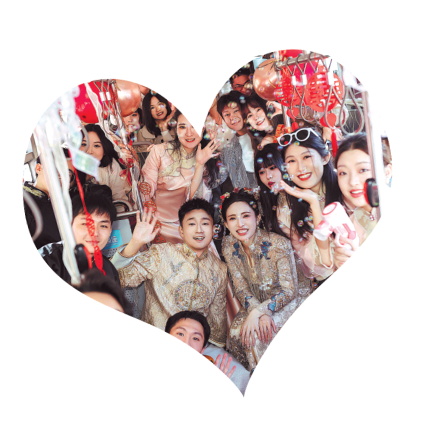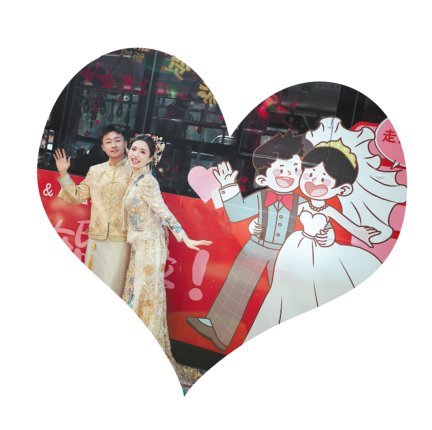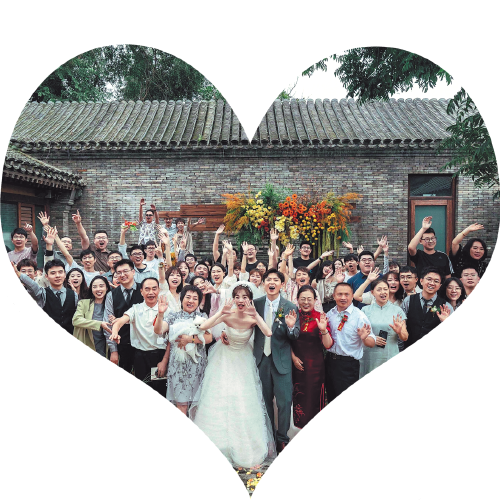CHILL, HAPPINESS — YOUNG COUPLES SAY 'I DO' TO CREATIVE NUPTIALS

Wedding traditions change as celebrants stamp individuality on ceremonies
On a recent Wednesday morning, 27-year-old copywriter Wu Yuncheng hopped on a city bus in Linyi, Shandong province. All the seats were taken and the passengers were exuberant and dancing to loud music.
It was just the kind of ride that Wu was looking for on that Oct 2 morning — one to her own wedding.
Aiming for a unique and budget-friendly experience, Wu and her husband broke from the tradition of taking themselves and family members to the wedding venue in a fleet of luxury cars. Instead, they rented a regular public bus adorned with balloons, cartoon stickers and auspicious ornaments, and invited their guests to join the ride.
The ride took Wu, her husband, Song Jiacheng, and about 20 guests past the city's landmark buildings and sights. "Our friends came from different regions across China, and some flew more than 30 hours from South America to give us blessings. The route was specially selected by my husband, a local, to give them a glimpse of the city's charm," Wu said.
On the bus, the couple and their guests danced to a playlist of energetic nightclub songs. They waved at strangers passing by who initially looked stunned, but then smiled back at them when they understood what was going on.
"We reveled in the beautiful scenery along the way while singing and shouting. I felt a blast of youthful energy," Wu said. "I could tell that my friends had a lot of fun, and even the older people who initially doubted the idea ended up applauding our choice."
The total cost of renting and decorating the bus was less than half the price of a wedding car fleet rental, she added.
Personal touches
Wu and her husband are not alone in rebelling against traditional wedding customs. Many of the usual trappings — such as convoys of fancy cars, lavish banquets and flamboyant emcees — have been ditched or pared down as a growing number of young couples opt for personalized touches, streamlined procedures, and a laid-back approach that prioritizes individuality over rituals.
A video that went viral online following this year's National Day holiday in early October — a peak time for tying the knot — showed a wedding at a McDonald's restaurant in Guangdong province.
The newlyweds were seen taking pictures holding auspicious paper-cuts and french fries at the fast-food eatery. On the table were hamburgers, fries, sodas and other typical McDonald's food items, a far cry from a conventional banquet featuring an extensive menu and multiple meat dishes.
The video sparked a competition among netizens, who shared their ideal wedding venues ranging from the hotpot chain Haidilao to karaoke bars.
A fashion blogger called Tracy said that no Chinese wedding is complete without an alcoholic drink, however, she instead opted to toast her nuptials with milk tea.
"Complete relaxation at my wedding and let's toast with a cup of milk tea," said the woman, who shared her wedding photos on lifestyle platform Xiaohongshu.
"The signature red package, coupled with my favorite flavor of oolong tea, with a hint of flowers, is a perfect match for my wedding. All I want for the occasion is chill and happiness," she added.
For some young people who are socially shy, or who already feel overwhelmed by work and household chores, a lot of wedding banquet customs — such as kneeling before parents and saying vows, exchanging rings and sharing a glass of wine — seem redundant. They believe the ceremony should be reduced to its barest form — a celebration with food.
Less is more
Yu Kang, a social media influencer in Hangzhou, Zhejiang province, wonders how many working people in their 20s and 30s have the luxury of enough time, energy and money to hold a traditional wedding.
For his nuptials in April, the 28-year-old did not arrange bridesmaids, groomsmen or hire a wedding planner. The couple held separate dinner banquets in each other's hometown. They hosted the ceremonies themselves and skipped as many traditions as possible.
"As a vlogger, I nearly have no breaks all year and my wife goes on business trips regularly," he said. "Neither of us are fans of complicated 'tear-jerking' procedures."
Despite the couple's insistence on a simple wedding, Yu said their relatives decided to take matters into their own hands. They hazed the couple, played games when the groom picked up the bride, and insisted on multiple lengthy toasts to the newlyweds.
"My ideal wedding would be kept on a small scale. I would only invite our close friends and our parents, or maybe even commence a marriage by traveling abroad," Yu said.
Ming Jie, a 33-year-old who lives in Jiangsu province, has emceed weddings for about a decade. He said a typical reception usually culminates in a 30-minute session during which the couple makes a grand entrance, performs a series of rituals, and ends with them paying respect to both sets of parents.
Some fads have come and gone, he said.
"From 2012 to 2015, it was trendy to splash holy water or splurge on fluorescent neon decorations, but now such trends have fizzled out," he said.
Ming has handled some unusual requests over the years, such as the groom riding a shared bicycle to pick up the bride or throwing a bunch of lettuce (in Mandarin, lettuce, or sheng cai, sounds like making a fortune) rather than flowers for the traditional bouquet toss.
Decorum still valued
The majority of couples, however, still follow a conventional wedding format, while unorthodox ones will add a special touch or twist to suit their taste.
"Sometimes, we reject ideas that go overboard. In Chinese culture, a wedding ceremony is also a precious opportunity for a family reunion, so it is necessary to take the feelings of elderly family members who might cringe at such oddities into consideration," Ming said.
Alternative wedding presentations aside, Ming said newlyweds these days seem to share an emphasis on freedom, self-expression and genuine displays of love.
"They do not want their occasion to be overly sentimental and enveloped in poignancy, or a sense of separation. They are looking for an outlet to express their love for each other and want attendees to truly have a good time."
A survey carried out in Guangzhou, Guangdong province, in recent years found that most newlyweds still hire emcees, cameramen, videographers and makeup artists for their nuptials, Pei Yuxin, a professor at Sun Yat-sen University's School of Sociology and Anthropology, said in an interview with China Youth Daily in March.
"The average amount spent on a wedding varies from a few hundred thousand yuan to over 100,000 yuan ($13,800), but they (the couples) tend to be rational and aware of their budget limits," she said.
Pei said an important factor behind the increasing popularity of so-called "minimalist" weddings is a stronger sense of autonomy among younger generations.
"In the past, the organization of a wedding event was dominated by parents or handed over to a wedding planning agency. There was a uniform set of procedures to follow and an emphasis on grandeur," she said.
"But nowadays, young people prefer actively participating in arrangements and incorporating their unique personalities and personal traits into the occasion."
Pei added that young people have taken a frugal approach to their weddings as they tighten their purse strings. "We have talked to young couples who DIY decorations, and shop online for cheaper ornaments to reduce expenses," she said.
Love, my way
In addition, young couples are not comfortable with occupying the spotlight throughout the wedding event. They are inviting more of their peers to the ceremony, and trying their best to engage them in playful and fun activities.
Parents, who used to have the final say in wedding logistics, have begun staying in the background, according to Pei. "Some parents will provide funds only and give their children full autonomy, although some still intervene in guest invitations and other affairs," she said.
As the size of households in China is becoming smaller, young couples will become more independent than their parents' generation when planning weddings. The old practice of parents using their children's wedding as an opportunity to develop and showcase social connections is gradually disappearing.
However, a strong sense of family remains ingrained in some young wedding couples.
Wu, the bride who took a bus to her wedding, said that she cared about the experiences of her parents and in-laws no less than those of her peers, and she valued their advice.
When her mother-in-law opposed hiring a public bus, Wu put great effort into persuading her it was a good idea by sharing successful examples from other couples.
In the end, it was a great relief to hear older people speaking highly of her wedding, she added.
"To my surprise, a friend told me that he shared my wedding with his younger brothers and sisters at home, and these youngsters, fearful of marriage, had expressed a longing for marriage," she said.
Zhai Jiayi and Fang Biling contributed to the story.
wangxiaoyu@chinadaily.com.cn
























